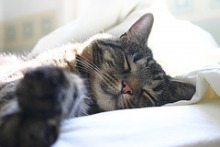One of the most common ailments that senior cats deal with is arthritis. This painful disorder can dramatically lower your feline's quality of life. Thankfully, however, it is oftentimes simple to treat.
What signs should you be looking for?
Kitty is not as frisky as usual.
Has your cat started becoming more sedentary? Does he no longer jump up on the bed? Do you see kitty stretch more than usual? These can all be signs of arthritis. As your cat's joints become inflamed or the cartilage padding becomes thinner, he will experience a great deal of pain. The easiest way for your kitty to fight the pain is by limiting his movements. Since running and jumping can trigger pain, they will avoid these activities. Your cat may even put on more weight due to the decline in their activity level.
Petting triggers hissing and growling.
Does your kitty no longer liked to be petted on his back? When you hit a certain spot, does he hiss or growl? If so, then he may be feeling pain in these areas. While this is not always indicative of arthritis, it can be a sign. If petting is no longer welcome, then take your cat to a vet right away. They will be able to diagnose the problem.
What if kitty does have arthritis?
Of course, you will be devastated to learn that your feline companion is facing this painful disease, but as his or her owner, it's your job to treat it. Many times, a simple dietary supplement is all you need. One of the most popular ones is a combination of glucosamine and chondroitin. These supplements lubricate the joints and help encourage growth of new cartilage. If a supplement does not take away all of the pain, your vet may recommend that your kitty takes anti-inflammatory medications or other prescription pills. Remember that arthritis, while not a death sentence, needs to be treated so that your cat continues living a pain-free life.
